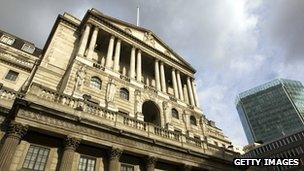Should JP Morgan have listened to Winters?
- Published
- comments

Only one of the Bank of England's three reviews into how it has conducted itself since the crisis of 2008 is being carried out by a commercial banker. In this case it is Bill Winters, rather than a former central banker (by the way, I should warn you that this is a blog BOGOF: reflections on JP Morgan and on the Bank of England's self-examination).
Whether that will make his probe more or less impartial, you can decide. But Mr Winters has a reputation - acquired when he was co-head of JP Morgan Investment Bank - for being his own person.
Mr Winters' independence of mind is of considerable topical interest right now - because Mr Winters is feted in some quarters for having made known to his colleagues at JP Morgan his unhappiness that the risks being taken by JP Morgan's Chief Investment Office were not transparent enough.
In view of the notorious loss recently announced by the CIO - estimated by Morgan at $2bn but widely expected to rise to $5bn - some would argue that Morgan's chairman and chief executive, Jamie Dimon, should perhaps have listened to Winters.
In the event, Winters' vocal unhappiness at the governance of the CIO, that it was a discreet trading operation answerable only to Dimon, and whose deployment of the bank's precious capital could not be scrutinised by other senior executives, was one of the reasons he was pushed out of the bank in the summer of 2009.
All of which is to suggest that neither the Bank of England or its clients in the City, the big banks, are likely to get from Winters the answer they most want about whether the Bank of England lends to banks at the right price, with appropriate security and with the necessary strings.
To be clear, the Bank of England's role in lending to banks, and indeed that of the central banks of all the developed economies, is massively more important than it was before the 2007 credit crunch.
Before then, in the boom years, central banks operated with much smaller balance sheets, supplying a modest amount of marginal lending to smooth out the bumps in markets. But in the summer of 2007, the spigot delivering funds to banks from other banks and financial institutions became blocked and dysfunctional - and it has never started gushing in the way that it did.
All of which is to say that central banks have to a large extent displaced the market, providing record volumes of loans to banks, and in return for assets or collateral of increasing diversity and - arguably - diminishing quality.
Even if the Bank of England has run down its Special Liquidity Scheme, that provided £185bn of exceptional and emergency funds to British banks, our banks remain more dependent on their access to central-bank funding than at any time in their history.
So here is an interesting question: if our banks are less able to stand on their own two feet, without the crutch of support or liquidity from taxpayer-owned central banks, should they be more mindful of their putative social responsibilities; and (oh yes) should bank executives be rewarded as lavishly as those in businesses (toothpaste makers, book vendors, Cornish-pasty bakers) which never receive state finance?
Answers below please.
There is a second fascinating question too: how and when does it become clear that markets are stressed not for mad irrational reasons but because banks are in fact insolvent or bust?
That moment of blinding revelation, that banks need to raise capital to protect themselves against losses, is the point at which the Bank of England and other similar central banks can no longer provide the kind of loans I have described. Instead, the Bank of England can only provide what is known as Emergency Liquidity Assistance, or rescue funding explicitly underwritten by the Treasury, which tides the banks over until they raise the necessary capital.
By definition, individual banks have "failed" when they receive Emergency Liquidity Assistance, or ELA. Royal Bank of Scotland and HBOS both failed in the autumn of 2008, when RBS received £36.6bn of ELA and HBOS borrowed £25.4bn.
As it happens, Ian Plenderleith - who was the Bank of England's markets man for donkeys years - is assessing how this lifeline was provided to RBS and HBOS.
For a bank's reputation, the verdict on whether it has failed or not is everything. Here is what gives nightmares to bank chief executives: there is not a clean distinction between a bank finding it difficult to borrow because of market "stress" and because it is bust.
The current health of eurozone banks is a very important case in point. A significant number of them have too little capital. Most of them are hugely dependent on borrowing from the European Central Bank and are profoundly grateful for the trillion euros of three-year rescue loans they have taken from the ECB in its LTRO.
The LTRO can be seen, and is seen by bankers, as a hidden injection of capital into the banks by eurozone taxpayers - because the banks borrow the three-year money at 1% and can re-lend it for considerably more.
The LTRO is a backdoor recapitalisation of the banks, without the explicit approval of eurozone taxpayers (a big hello to the people of Germany).
Or to put it another way, if the ECB were playing by the Bank of England's Wisden rules, it would not have been able to provide the LTRO (it is not cricket for a central bank to inject capital into banks.)
In view of the perilous conditions in the eurozone, perhaps we should be grateful that the ECB has not put a bunch of huge eurozone banks on notice that they are bust. But do you think that any bank that has taken LTRO cash should be paying dividends to shareholders or bonuses to executives?